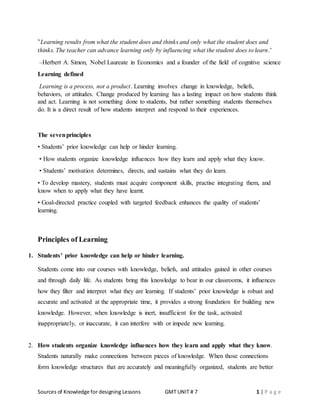
Learning principles
- 1. Sources of Knowledge for designing Lessons GMT UNIT # 7 1 | P a g e ‘Learning results from what the student does and thinks and only what the student does and thinks. The teacher can advance learning only by influencing what the student does to learn.’ –Herbert A. Simon, Nobel Laureate in Economics and a founder of the field of cognitive science Learning defined Learning is a process, not a product. Learning involves change in knowledge, beliefs, behaviors, or attitudes. Change produced by learning has a lasting impact on how students think and act. Learning is not something done to students, but rather something students themselves do. It is a direct result of how students interpret and respond to their experiences. The sevenprinciples • Students’ prior knowledge can help or hinder learning. • How students organize knowledge influences how they learn and apply what they know. • Students’ motivation determines, directs, and sustains what they do learn. • To develop mastery, students must acquire component skills, practise integrating them, and know when to apply what they have learnt. • Goal-directed practice coupled with targeted feedback enhances the quality of students’ learning. Principles of Learning 1. Students’ prior knowledge can help or hinder learning. Students come into our courses with knowledge, beliefs, and attitudes gained in other courses and through daily life. As students bring this knowledge to bear in our classrooms, it influences how they filter and interpret what they are learning. If students’ prior knowledge is robust and accurate and activated at the appropriate time, it provides a strong foundation for building new knowledge. However, when knowledge is inert, insufficient for the task, activated inappropriately, or inaccurate, it can interfere with or impede new learning. 2. How students organize knowledge influences how they learn and apply what they know. Students naturally make connections between pieces of knowledge. When those connections form knowledge structures that are accurately and meaningfully organized, students are better
- 2. Sources of Knowledge for designing Lessons GMT UNIT # 7 2 | P a g e able to retrieve and apply their knowledge effectively and efficiently. In contrast, when knowledge is connected in inaccurate or random ways, students can fail to retrieve or apply it appropriately. 3. Students’ motivation determines, directs, and sustains what they do to learn. As students enter college and gain greater autonomy over what, when, and how they study and learn, motivation plays a critical role in guiding the direction, intensity, persistence, and quality of the learning behaviors in which they engage. When students find positive value in a learning goal or activity, expect to successfully achieve a desired learning outcome, and perceive support from their environment, they are likely to be strongly motivated to learn. 4. To develop mastery, students must acquire component skills, practice integrating them, and know when to apply what they have learned. Students must develop not only the component skills and knowledge necessary to perform complex tasks, they must also practice combining and integrating them to develop greater fluency and automaticity. Finally, students must learn when and how to apply the skills and knowledge they learn. As instructors, it is important that we develop conscious awareness of these elements of mastery so as to help our students learn more effectively. 5. Goal-directed practice coupled with targeted feedback enhances the quality of students’ learning. Learning and performance are best fostered when students engage in practice that focuses on a specific goal or criterion, targets an appropriate level of challenge, and is of sufficient quantity and frequency to meet the performance criteria. Practice must be coupled with feedback that explicitly communicates about some aspect(s) of students’ performance relative to specific target criteria, provides information to help students progress in meeting those criteria, and is given at a time and frequency that allows it to be useful. 6. Students’ current level of development interacts with the social, emotional, and intellectual climate of the course to impact learning. Students are not only intellectual but also social and emotional beings, and they are still developing the full range of intellectual, social, and emotional skills. While we cannot control
- 3. Sources of Knowledge for designing Lessons GMT UNIT # 7 3 | P a g e the developmental process, we can shape the intellectual, social, emotional, and physical aspects of classroom climate in developmentally appropriate ways. In fact, many studies have shown that the climate we create has implications for our students. A negative climate may impede learning and performance, but a positive climate can energize students’ learning. 7. To become self-directed learners, students must learn to monitor and adjust their approaches to learning. Learners may engage in a variety of metacognitive processes to monitor and control their learning—assessing the task at hand, evaluating their own strengths and weaknesses, planning their approach, applying and monitoring various strategies, and reflecting on the degree to which their current approach is working. Unfortunately, students tend not to engage in these processes naturally. When students develop the skills to engage these processes, they gain intellectual habits that not only improve their performance but also their effectiveness as learners.